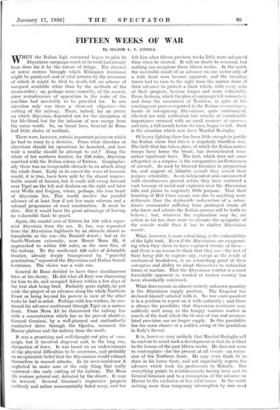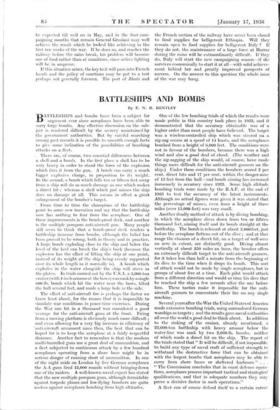FIFTEEN WEEKS OF WAR
By MAJOR L. I. ATHILL
WHEN the Italian high command began to plan its Abyssinian campaign much of its work had already been done for it by -the nature of things. The absence of nerve centres • through which Ethiopian resistance might be paralysed, and of vital arteries by the severance of which it might be bled to death, left no scheme of conquest available other than by the methods of the Steam-roller ; or, perhaps more correctly, of the mower, since recrudescence of opposition in the wake of the machine had inevitably to be' provided for. In one direction only was there a clear-cut objective—the cutting of the railway, There, indeed, lay an artery on which Abyssinia depended not for the circulation of her life-blood, but for the infusion of new energy from the outer world. So, on broad lines, General de Bono had little choice of methods.
There were, however, certain important points on which he had to come to a decision. From what direction or directions should his operations be launched, and how wide a swathe should he attempt to cut ? Along the whole, of her northern frontier, for 250 miles,. Abyssinia marched with the Italian colony of Eritrea. Geographic- ally there was no insuperable obstacle to an attack along the whole front. Early in its career the wave of invasion would, it is true, have been split by the almost impene- trable massif of S.amien, but it .could still sweep forward over Tigre, on the left and Amhara on the right and later over Wollo and Gojjam, where, perhaps, the true heart of Abyssinia lies. This would involve the parallel advance of. at least four if not five main columns and a eploasal programme of ..road: construction. It must be slow. But it would have the great advantage of leaving no: vulnerable flank to guard.
Agait,.the coastal arm of Eritrea for 250 miles separ- ated Abyssinia from the sea. It, too, was separated from the Abyssinian highlands by an obstacle almost as formidable as the sea—the Danakil desert ; but at its South-Western extremity, near Mount Musa Ali, it approached to within 100 miles, as the crow flies, of the railway- To. the south-east 450 miles of debatable frontier, already deeply transgressed by " peaceful penetration," separated the Abyssinian and Italian Somali territories. The choice was a wide one.
Geneial de Bono decided to have three simultaneous bites at his cherry. He did what all Italy was clamouring for him to do, and- occupied Adowa within a few days of the first shot being fired. Probably quite rightly, he put aside the project of an advance along the whole Northern Front as being beyond his powers in view of the other tasks he had in -mind. Perhaps with less wisdom, he con- tinued his advance southward through Tigre on a narrow front. From Musa Ali he threatened the railway line with a concentration which has so far proved abortive. General Graziani, by a well-planned and methodically conducted drive through the Ogaden, menaced the Harrar plateau and the railway from the south.
It was a promising and well-thought-out plan of cam- paign, but it involved dispersal and, in the long run, dissipation of force. It was based on an underestimate of. the physical difficulties to be overcome, and probably on an optimistic belief that the Abyssinians would exhaust themselves in massed attacks. In its over-confidence it neglected to make sure of the only thing that really mattered—the early cutting of the railway. The Musa All venture petered out, defeated by the desert. It may be revived. General Graziani's impressive progress suddenly and rather unaccountably faded away, and- has left him after fifteen precious weeks little more advanced then when,he started. It will no doubt be resumed, but nothing can recapture those fifteen weeks. In the north the inevitable result of an advance on one sector only of a wide front soon became apparent, and the invading forces had to turn to the right from the narrow front of their advance to protect a flank which, with every mile of their progress, became longer and more vulnerable. From Amhara, which-the plan of campaign left untouched, and from the- mountains of Tembien, in spite of the combing-out process reported in the Italian communiques, bands of enterprising Abyssinians, quite undismayed, effected not only infiltration but attacks of considerable importance crow=ned with no small measure of success ; and rain, a full month before its time, began to fall: Such is the situation which now faces Marshal Badoglio.
Of heavy fighting there has been little enough to justify the Italian claim that this is a singularly bloodless war. The little that has taken place, of which the Italian native troops have borne the brunt, has demonstrated some rather significant facts. The first, which does not come altogether as a surprise, is the comparative ineffectiveness of aircraft: As used by General Graziani in preparation for, and support of, infantry assault they served their purpose admirably. As an independentarm unconnected with simultaneous ground action they have scattered a vast tonnage of metal and explosive over the Abyssinian hills and plains to singularly little purpose. That their bombing of Red CrosS camps was due to anything more deliberate than the deplorable indiscretion of a subOr- dinate coMmander suffering from prolonged strain all who know and admire the Italian airman will be loath to believe ; but, whatever the explanation may be, air action so far has done more to alienate the sympathy of the outside world than it has to shattcr Abyssinian morale.
What, however, is more astonishing, is the vulnerability of the light tank. Even if the Abyssinians are exaggerat- ing when they claim to have captured twenty of these-7- and there is no reason to think that they arc—the fact of their being able to capture any, except as the result of mechanical breakdown, is an astonishing proof of their enterprise and ability to adapt themselves to unfamiliar forms of warfare. That the Abyssinian warrior is a most formidable opponent in wooded or broken country has been abundantly confirmed.
What does remain an almost entirely unknown quantity is the Abyssinian supply position. The Emperor has declared himself satisfied with it. No war correspondent is in a position to report on it with authority ; and there is always the possibility that Abyssinian resistance may suddenly melt away as the hungry warriors scatter in search of the food which the theatre of war and accumu- lated provision can no longer supply. In this possibility lies the main chance of a sudden swing of the pendulum in Italy's favour.
It is, however, very unlikely that Marshal Badoglio will be content to await such a development or that he is blind to the lessons of the past fifteen weeks. He does not seem to contemplate—for the present at all events—an exten- sion of the Northern front. lie may even think fit to draw in his horns there, and not improbably regrets the advance which took his predecessor to Makalle. But everything points to reinforcements having been sent to General Graziani and to a resumption of the advance on Harrar to the exclusion of less vital issues. In the south nothing more than temporary interruption by rain need be expected till well on in May, and in the four cam- paigning months that remain General Graziani may well achieve the result which he looked like achieving in the first ten weeks of the war. If he does so, and reaches the railway before the rains break, his. problem will become one of food rather than of munitions, since active fighting will be in suspense.
If this situation arises, the key to it will pass into French hands and the policy of sanctions may be put to a test perhaps not generally foreseen. The port of Jibuti and the French section of the railway have never been closed to food supplies for belligerent Ethiopia. Will they remain open to food supplies for belligerent Italy ? If they do not, the maintenance of a large force at Harrar during the rains will be extraordinarily difficult. If they do, Italy will start the new campaigning season----if she survives economically to start it' t all—with solid achieve- ment behind her and greatly improved prospects of success: On the answer to this question the whole issue of the war may hang.







































 Previous page
Previous page